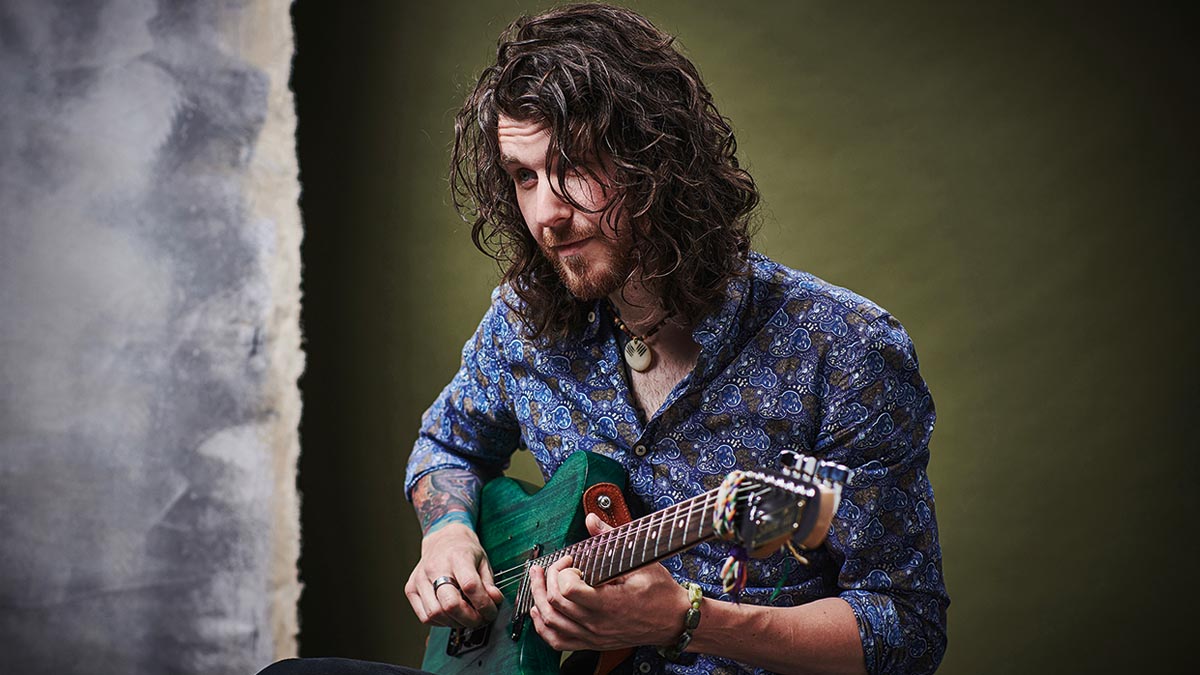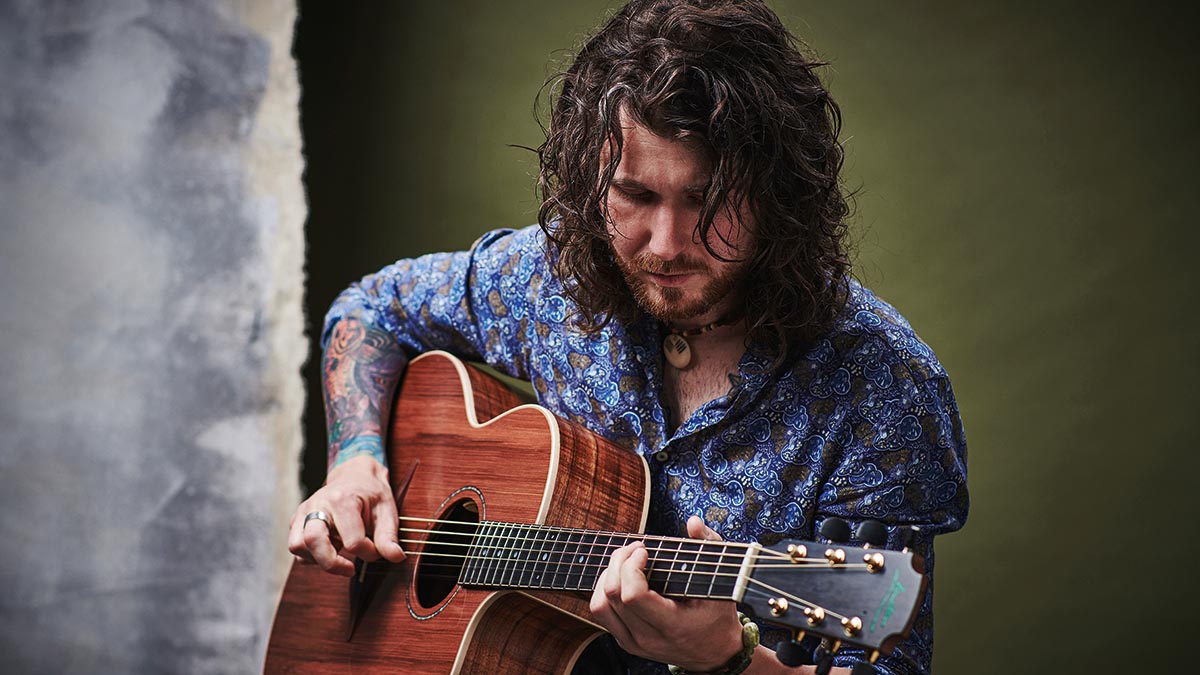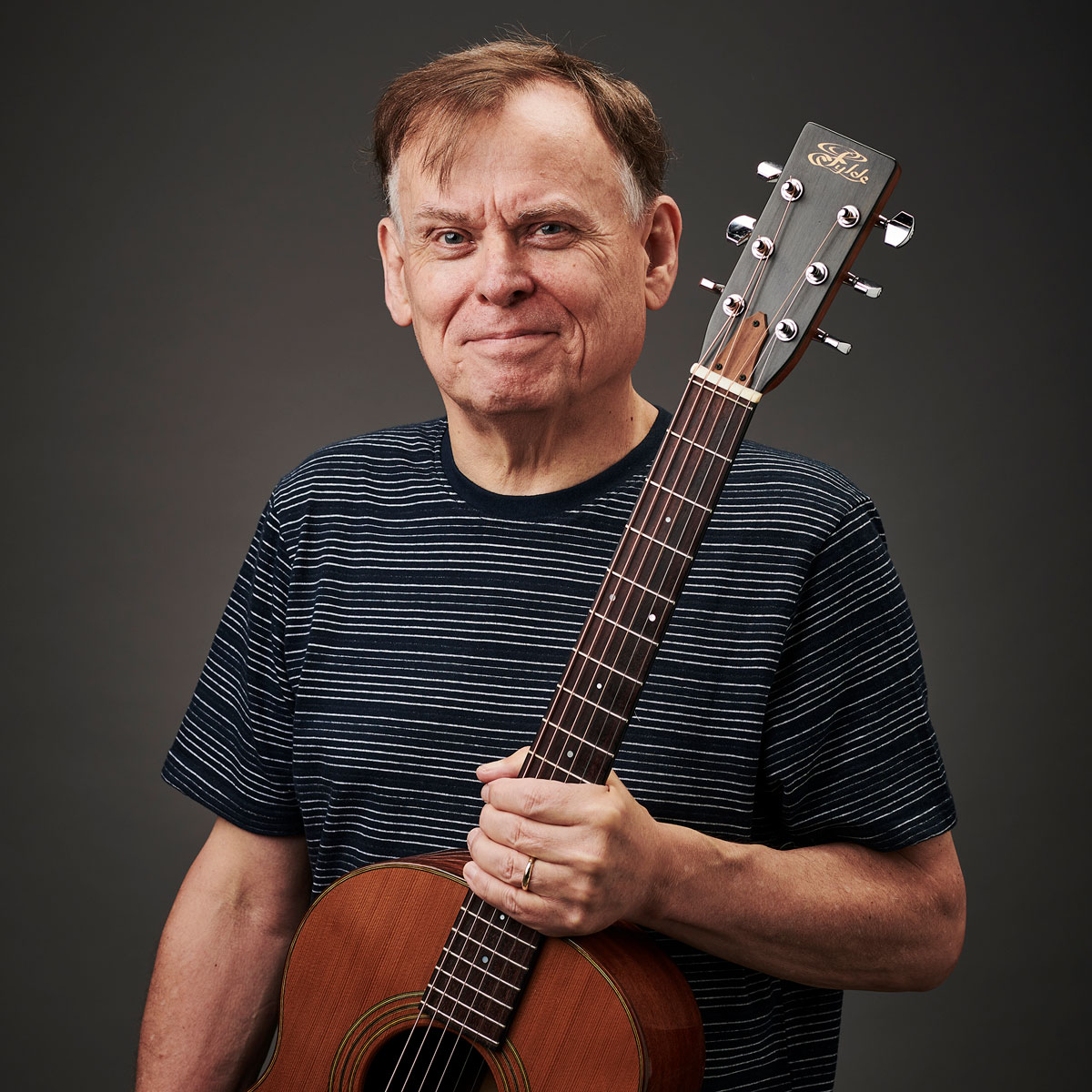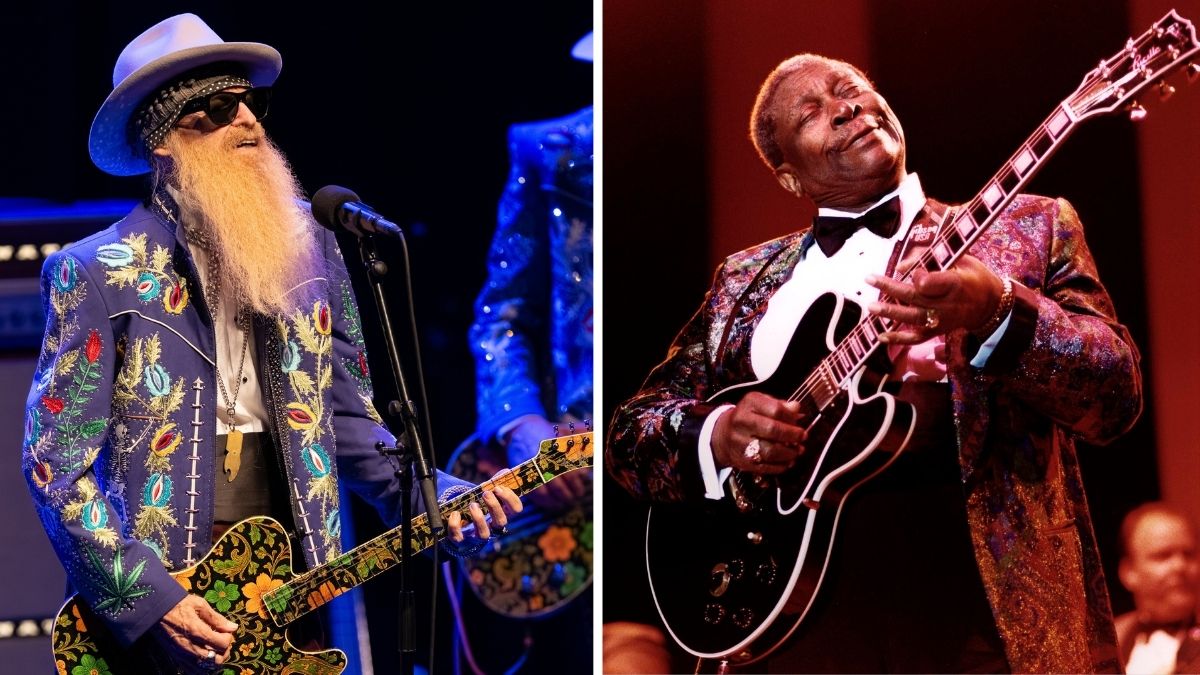Meet Dom Martin, the Belfast-born guitarist who may just be Rory Gallagher’s musical inheritor
They start guitar players young in Ulster. Dom Martin began playing aged 5, but after support slots with Eric Gales and a thrilling new album, is this the next blues-rock great from the six counties?

All the latest guitar news, interviews, lessons, reviews, deals and more, direct to your inbox!
You are now subscribed
Your newsletter sign-up was successful
“My father held me over a guitar the day I was born and I just kicked it and scratched it and cried on it. And it’s been that way for 31 years…” While this sounds like a voiceover at the beginning of a biopic, it may well end up that way if Belfast blueser Dom Martin’s career trajectory remains on its current course.
Fresh from a UK tour supporting Eric Gales, armed with a partscaster Tele and backed by bass player Dave Thompson and drummer Laurence McKeown in the classic blues-rock power-trio format, Dom delivered performances that garnered praise from fans and critics alike.
The tour embellished an already impressive list of endorsements and awards, but that’s not all. Dom is also a seriously good acoustic guitarist with a string of plaudits to his name in that field as well, including Best Solo Acoustic Act in the 2019 European Blues Awards.
With influences that include Rory Gallagher and Roy Buchanan stamped on every note he plays, Dom’s future is an open road, which may yet lead to greatness. But what about the past? We were curious how the journey continued after his (very) early initiation...
How old were you when you first properly picked up a guitar?
“I guess it was around the age of five years old when I could do rudimentary chords. I started learning to fingerpick Ralph McTell’s Streets Of London. That was really frustrating, not being able to do it, not realising it takes years of practice. After I learned that, I started trying to sing it – singing and playing at the same time was a problem for many years. I reckon I was around 10 when I could sing and play at the same time.
“The biggest thing for me growing up was music and guitar playing. All my father did was listen to music and play guitar, so I just learned as much as I could from him. He gave me a tape, it was Rory Gallagher Live In Europe on one side and Blueprint on the other, and that was my whole childhood.”
All the latest guitar news, interviews, lessons, reviews, deals and more, direct to your inbox!
The streets I grew up on, it was just outlaw country. There was a lot of criminality, a lot of drugs. The police didn’t do anything, the streets were run by the criminals
What was it like growing up in Belfast?
“The streets I grew up on, it was just outlaw country. There was a lot of criminality, a lot of drugs. The police didn’t do anything, the streets were run by the criminals. So I chose to stay away from it for as long as I could and, basically, I just sat in a room, playing along to Rory Gallagher and Pink Floyd and Led Zeppelin, and it kept me off the streets.
“But there’s a negative side to it as well: your social skills are non-existent. But I learned a lot from Rory and I learned a lot from Roy Buchanan as well. I always play their songs [live] and I always tell the story about them, because I just feel so passionate about them, and their early death and the way they died was just horrible.”
When did you start getting into playing in bands?
“I didn’t, honestly. It was a solitary life for a long time. I wasn’t in a band until maybe five years ago. There were teething problems and stuff like that, but it was great because we were playing rock ’n’ roll and I’d just picked up my first electric. I was always an acoustic player, I’d never really played electric before.
“You look at people like Eric Gales and Joe Bonamassa and you see how good they are and all they’re capable of, and it’s okay, playing a million notes a minute, but it’s nothing if you can’t feel it. You know what I mean? You have to put a lot of feeling under that. I don’t want to play a million notes a minute. For me, it’s all about feeling.”
We met Eric Gales outside the venue and he was having a cigarette in his van and I thought, ‘I’ll just leave him alone…’ I didn’t want to go over and start fanboying
Despite being relatively young, you’ve certainly led the life of a bluesman to its fullest extent.
“After my dad died, I became a magnet for addicts and murderers and drug dealers and alcoholics, and I tagged along for the ride. For about four years I didn’t play guitar at all, and it took me a long time to come back from that. I stopped taking drugs about seven years ago and I’m now over two years sober.
“I have a young kid, an older daughter and a wife, and I have responsibility now. I learned all the mistakes from my dad, you know; I’m not gonna make them again. I kind of broke the circle. I’m very proud of that.”
What was it like touring with Eric Gales?
“It was scary at first. We met him outside the venue and he was having a cigarette in his van and I thought, ‘I’ll just leave him alone…’ I didn’t want to go over and start fanboying. When you’re the support act, most of the time you get treated like crap anyway; you’re not allowed in the dressing room and all these kinds of things. But it wasn’t like that at all.
“After a couple of gigs, we were getting on like a house on fire. They’re just such lovely people and they go out of their way to help you. And it’s mutually beneficial because we’re helping them load into their van at the end of the night, and they’re doing the same for us. It was sad when it ended and we were all in our vans driving off into the sunset.”
How did your material go down with the audiences?
“Well, I can’t speak for the audience, but I think it went down well because it’s so different. We only had a 50-minute set, so we tried to keep it as original as possible because we’re trying to promote ourselves. But, yeah, from the feedback that we got from it, everything was okay.”
Tell us about the partscaster you currently use live.
“The body came first. I was on my very first tour back in 2017 and this cherry red glitter [T-style] came up on Gumtree, and I phoned my wife and said, ‘I need this Tele, will you go and pick it up?’ In my mind I was already stripping the paint off it and trying to do things, you know. I had that for a couple of months and the pickups in it were Tonerider and they were nice as well.
“I knew the neck wasn’t gonna be good enough. It’s an SX guitar, the cheapest of the cheap, I guess, but I had this old 90s Fender Strat neck and it fitted. I spent about 100 hours sanding the body in my back garden and I fired some green stain on it about five or six times. It’s gonna get beat to hell and it’s already starting to see a lot of signs of wear, but I like that anyway. In 20 years from now it’s gonna be one hell of a beat-up guitar.”
As far back as I can remember I always wanted a Lowden. Where I come from, they’re the top of the line
Your Lowden guitar was a custom build, too, wasn’t it?
“As far back as I can remember I always wanted a Lowden. Where I come from, they’re the top of the line. I had an Avalon, which was basically a Lowden [style], but it was a big jumbo thing; it’s huge, a massive guitar. After a couple of years of battering away on that I started getting this pain in my right shoulder blade and it was just because of that.
“I needed a smaller-body guitar and Lowden just fit the bill. We went and we talked with George and we designed this one-of-a-kind guitar, which I hope lasts. They all say that you can build a guitar that will last or you could build a guitar that sounds really good. This guitar sounds really good, but I don’t know how long it’s gonna last.”
Which particular woods did Lowden use to make your guitar?
“Tasmanian blackwood and sinker redwood, which is a great combination. I’ve played a million acoustic guitars from cheap to dear and all in-between: Taylors, Martins, Gibsons, Fenders – the whole lot of them. And this particular guitar, as soon as you hit it, the whole body is vibrating. It’s alive. I love it.
“Lowden doesn’t use jumbo frets, but I need jumbo frets to play. It’s just a necessity and it took me years to figure out. I was always wondering, ‘Why is this not working? Why does this feel uncomfortable?’ Everybody seems to use these little tiny baby frets. But Lowden was happy to put some big wire on – although it could have been bigger, but sure, I’m not gonna grab at straws.”

What do you think the future holds for you?
“I have no idea. I really don’t know. I hope that I can continue playing music and I hope people start buying tickets again. Nobody’s buying tickets, and nobody can sell out a show any more. But I hope it gets better. Covid really messed everything up, not just for musicians, the whole world. It’s still pretty devastated; it’s rocked music to its foundation and a lot of people have quit. They’re not coming back – and they were really good. And they’re just gone.
As far as the future goes, I’m going to try to do as many gigs as I can. Just continue to pay my rent and keep feeding my kids, and if I can do that, I’m happy enough
“I’ll always make albums, if I’m not doing gigs. They’ll always be some form of creativity being done somewhere, but there’s no guarantees in this business. And it is a business. It’s a very, very horrible and traumatic business to be in sometimes. I’m lucky enough, I’ve got a really good management team.
“Without them, I’d be… I don’t know what the hell I’d be doing. You need somebody that isn’t scared to start asking questions or start poking around booking agents and stuff, because who knows what they’re up to? But as far as the future goes, I’m going to try to do as many gigs as I can. Just continue to pay my rent and keep feeding my kids, and if I can do that, I’m happy enough.”
- A Savage Life is available now via Dom Martin Music.
With over 30 years’ experience writing for guitar magazines, including at one time occupying the role of editor for Guitarist and Guitar Techniques, David is also the best-selling author of a number of guitar books for Sanctuary Publishing, Music Sales, Mel Bay and Hal Leonard. As a player he has performed with blues sax legend Dick Heckstall-Smith, played rock ’n’ roll in Marty Wilde’s band, duetted with Martin Taylor and taken part in charity gigs backing Gary Moore, Bernie Marsden and Robbie McIntosh, among others. An avid composer of acoustic guitar instrumentals, he has released two acclaimed albums, Nocturnal and Arboretum.






